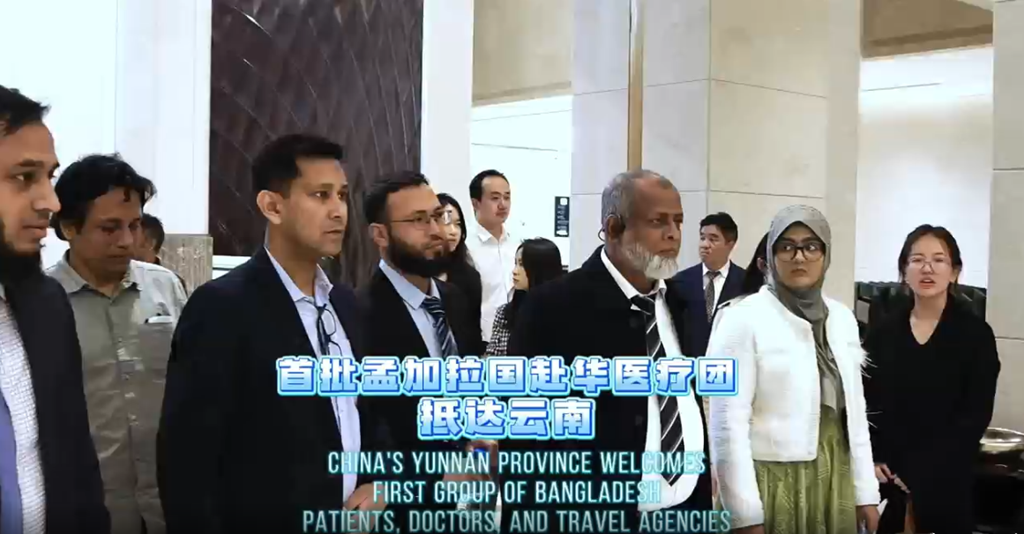Yunnan: Vital gateway for Bangladesh-China exchange, cooperation
This year marks a significant milestone: the 50th anniversary of diplomatic relations between China and Bangladesh, alongside the designated Year of China-Bangladesh People-to-People Exchange. To commemorate this, our reporter recently conducted exclusive interviews with Abdul Moyeen Khan, member of the National Standing Committee of the Bangladesh Nationalist Party (BNP), and Nazmul Islam, the Bangladeshi Ambassador to China, during their visit to Yunnan. Both underscored Yunnan’s pivotal role as an important gateway for Bangladesh-China exchanges and cooperation. They expressed a strong desire to strengthen connectivity and collaboration with Yunnan, aiming to foster even closer ties between the peoples of Bangladesh and China.

The first batch of Bangladeshi patients reach central Yunnan’s Kunming city for medical treatment on March 10.
New opportunities for Bangladesh-Yunnan cooperation
By Han Chengyuan, Wang Shixue, and Wang Jingzhong
“In the global development landscape, the ‘Global South’ is on the rise. China, as the world’s second-largest economy, boasts remarkable achievements in scientific and technological innovation and is leading this historical process,” stated Abdul Moyeen Khan, a member of the National Standing Committee of the Bangladesh Nationalist Party (BNP), during his recent visit to Yunnan.
While Southern countries have traditionally been in a catch-up position relative to the North, times are shifting. Abdul Moyeen Khan highlighted this change, asserting: “The dominant force in the future world will no longer be military strength, but rather scientific and technological innovation capabilities. China is expected to become the world’s largest economy by 2035, with its technological development also leading globally. In this sense, China is leading ‘Global South’ countries in achieving a historical leap.”
“While modern diplomatic relations between Bangladesh and China began 50 years ago, their civilizational exchanges date back millennia.” Abdul Moyeen Khan elaborated on this historical depth, recalling the Tang Dynasty monk Xuanzang’s visit to Bangladesh and the renowned Bangladeshi Buddhist master Atisha Dipankara Srijnana’s journey to China for exchanges. He stressed that, in the current geopolitical context, deepening Bangladesh-China relations holds special strategic significance. Khan urged both sides to leverage the 50th anniversary of diplomatic ties as an opportunity to strengthen practical cooperation in areas such as scientific and technological innovation, infrastructure, and cultural and people-to-people exchanges.
Despite the lack of a shared land border, Abdul Moyeen Khan emphasized the close bond between Bangladesh and China, stating: “If you talk to ordinary people in Bangladesh, they will tell you that China is a very close and friendly neighbor.” He held Yunnan, the closest Chinese province to Bangladesh, in high regard for its role in bilateral cooperation. Khan noted Kunming’s rapid development over the past decade, particularly the significant improvements in Yunnan Province’s infrastructure and its increased openness. He believes these developments will crucially support economic and trade cooperation between the two nations.
Strengthening connectivity with Yunnan
By Han Chengyuan, Liu Ziyu, and Wang Jingzhong
This year marks the 50th anniversary of diplomatic relations between China and Bangladesh, and is also the Year of China-Bangladesh People-to-People Exchange. In a recent exclusive interview in Kunming, Bangladeshi Ambassador to China, Nazmul Islam, expressed his eagerness to leverage this special occasion to deepen comprehensive cooperation with China, especially with Yunnan Province.
China and Bangladesh share a strong bond as close neighbors and partners in common development. Nazmul reflected on this profound friendship, saying: “Since the formal establishment of diplomatic relations on October 4, 1975, Bangladesh-China relations have developed into a comprehensive strategic partnership. Cooperation between the two sides has yielded fruitful results in various fields, including politics, economic and trade investment, and cultural exchanges.” He highlighted recent strides in medical cooperation, which have not only brought tangible benefits to the people of Bangladesh but also deepened the connection between the two nations. On the occasion of the 50th anniversary of Bangladesh-China diplomatic relations, he expressed his hope for further deepening friendly exchanges between their peoples. He also shared that this year, the Embassy of Bangladesh in China plans to launch a series of initiatives designed to promote mutual understanding and strengthen friendship across various sectors of both countries.
Nazmul highlighted China’s widely recognized development achievements, noting that this year China will implement new measures to expand high-level opening up. He said: “As a member of the ‘Global South,’ China consistently shares its experience in modernization and high-quality development with an open attitude. Bangladesh looks forward to learning from China’s experience, deepening cooperation with China, and moving forward hand in hand.”
Nazmul’s visit to Yunnan prompted considerable reflection. He had previously visited the province, China’s closest to Bangladesh, for work between 2007 and 2010 while serving at the Embassy of Bangladesh in China. During that earlier visit, he was deeply impressed by Kunming, a city renowned for its year-round spring-like climate.
“Yunnan serves as a crucial gateway for exchange and cooperation between Bangladesh and China,” stated Nazmul. “Its geographical proximity to Bangladesh allows it to play a significant role in promoting bilateral cooperation across numerous fields, including trade and investment, agriculture, healthcare, cultural education, training and research, and green energy development.” He added, “Every time I visit Yunnan and connect with friends here, I feel a deep sense of warmth.” Looking ahead, he expressed a desire to strengthen connectivity with Yunnan and concurrently expand cooperation into new areas such as health tourism, digital economy, cross-border e-commerce, and the development of new quality productive forces, thereby bringing the peoples of Bangladesh and China even closer together.
Translated by YNTA
Proofreading by Zu Hongbing